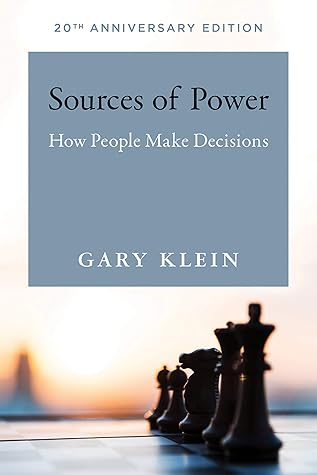More on this book
Community
Kindle Notes & Highlights
by
Gary Klein
Read between
December 24 - December 25, 2023
My claim in this chapter is that intuition grows out of experience.
the commander in this case was not aware of the way he used his experience. Rather than giving him specific facts from memory, the experience affected the way he saw the situation. Another reason that he could not describe his use of experience was that he was reacting to things that were not happening rather than to things that were.
“No, I really don't like the way you look,” she continued. “We're going to the hospital.”
AEGIS cruiser, the USS Vincennes. As part of a project we did for the U.S. Office of Naval Research, I interviewed him about several incidents involving time-pressured decision making.
By coincidence, an Iranian military aircraft did take off from Bandar Abbas just when the Vincennes received the Mode II response. The military airplane was squawking Mode II. So there was no decision error here, just a human error that let the Airbus become correlated with a Mode II signal reserved for military airplanes.
A very large screen display showed the big picture, but this display did not show altitude. Instead, altitude was listed on a small alphanumeric display off to the side of the primary display. The altitude of a track was given as a four-digit number, so 13,000 feet would appear as 1300. This number was embedded in a list of other numbers showing range, speed, bearing, and so on. This small screen was hard to read, especially if a crew member had to abandon what he was watching on the large screen to search through the small one. The more critical problem noted by the Fogarty report was that
...more
A leverage point is a focus for building a solution. It is the starting point for insightful problem solving.
In 1952, Masaru Ibuka, working for Tokyo Tsushin Kogyo (later to become Sony Corporation), saw an opportunity to use transistors for consumer products. He believed his company could somehow build and market a transistor radio that could fit in a shirt pocket.
two reactions to a potential problem. Both the captain and the observer had access to the same information. Both realized all the ways in which the landing was becoming risky. The observer identified the situation as problematic, requiring nonroutine action. In contrast, the captain appeared to be ignoring the warning signs
Once we see how to move from hold to hold, we have a plan. We also know we will be changing the plan during the climb as we notice new features. We may have gaps in the plan where we do not see the connection but trust that we will find it when we get that far.
In many fields, the time needed to develop expertise is up to ten years.
we similarly organize the cognitive world—the world of ideas, concepts, objects, and relationships. We link these up into stories. By understanding how this happens, we can learn to
A story is a blend of several ingredients:1 Agents—the people who figure in the story. Predicament—the problem the agents are trying to solve. Intentions—what the agents plan to do. Actions—what the agents do to achieve their intentions. Objects—tools the agents will use. Causality—the effects (both intended and unintended) of carrying out actions. Context—the many details surrounding the agents and actions. Surprises—the unexpected things that happen in the story.
attorney if lawyers receive much training in story building. He said there is virtually no such training. Law school concentrates on legal arguments, precedents, rules of evidence, and other matters, not on training what makes people accept or reject stories.
“You didn’t say anything about a mug. You asked for glue, and that’s what I bought. Was I supposed to read your mind?”
Frederick Charles promptly responded, “His Majesty made you a major because he believed you would know when not to obey his orders.”
The Commander’s Intent statement helps the soldiers read the commander’s mind if they run into uncertainty about how to carry out the orders under field conditions.
If you do not trust them, get others or do a better job of training. Just do not fall into the trap of choreographing each of their movements.
by telling you the rationale, I am giving you a chance to suggest a different plan.
commander or leader who specifies time and resources is micromanaging.
in chaotic natural settings, schedules will slide, and resources will shrink or expand over the life of a project or mission.
The art of describing your intent is to give as little information as you can. The more details you pack in, the more you obscure your main points.
We can make training more efficient but cannot radically replace the accumulation of experiences.
Naturalistic decision making research may be closer to anthropology than psychology.
I want to have an impact on your perceptions. When you are with other people, listening to their stories and telling your own stories, you may find yourself listening and speaking differently.


